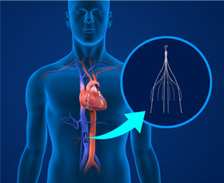FDA Issues Warning on Inferior IVC Filters
At Haun Mena, we pride ourselves on helping injured families all over the State of Texas. In handling cases for our clients, we occasionally notice a product that is causing more injuries than it should. Our research indicates that the IVC filter may be one of those products.
[su_spacer]
What is an IVC Filter?
I VC filters are small, metal devices that are placed in the inferior vena cava (IVC) to capture blood clots before they reach the heart or the lungs. The inferior vena cava is a major vein that brings blood from the legs and lower body back to the heart to replenish the blood with oxygen. Patients who are at risk for blood clots or pulmonary embolisms are sometimes given IVC filters. However, once the filter is implanted, patients have begun to notice recurring problems. Removal becomes difficult or impossible, long after the device has outlived its useful purpose.
VC filters are small, metal devices that are placed in the inferior vena cava (IVC) to capture blood clots before they reach the heart or the lungs. The inferior vena cava is a major vein that brings blood from the legs and lower body back to the heart to replenish the blood with oxygen. Patients who are at risk for blood clots or pulmonary embolisms are sometimes given IVC filters. However, once the filter is implanted, patients have begun to notice recurring problems. Removal becomes difficult or impossible, long after the device has outlived its useful purpose.
[su_spacer]
What is the problem?
Beginning in 2010, the Food and Drug Administration (the “FDA”) started noting issues with IVC filters. In 2014, the FDA released a safety communication stating:
The FDA is concerned that retrievable IVC filters, when placed for a short-term risk of pulmonary embolism, are not always removed once the risk subsides. 1
This warning shook up the field of medicine. Many IVC filters were marketed as “optional retrieval” devices, meaning that the manufacturers sold the products to physicians and patients as being a permanent solution to a dangerous problem. However, the FDA now recommends that IVC filters are removed “as soon as protection from pulmonary embolism is no longer needed.” 2
We have seen a large number of patients who have experiences serious injuries because of IVC filters. Some of these injuries include:
- Fracture – part of the filter breaks and enters the bloodstream
- Migration – the filter comes loose and moves into another party of the body
- Embedding – the filter becomes embedded in the wall of the IVC
- Over-penetration – the arms of the filter puncture the walls of the inferior vena cava
- Perforation – the filter punctures an organ like the aorta or lungs
- Tilt – the IVC filter shifts within the vein, altering blood flow and making removal difficult
The real problem with IVC filters is that the complications with the product are not always obvious to the patient. The filter may appear to be doing its job, but without proper testing and diagnostics, the patient may never know that the product is in danger of fracturing, migrating to the heart, or in certain rare instances, causing death.
If you have questions about IVC filters, please do not hesitate to contact us at (713) 781-8600. As always, it won’t cost you a penny to talk to a lawyer.





